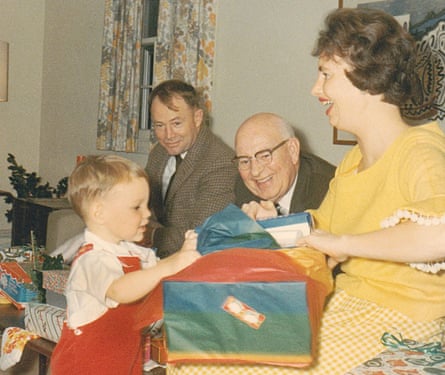
When I was a child, there was always a moment – at some point in the middle of the afternoon on Christmas Eve – when my mother would lose it. Preparations would be under way and behind schedule, and my siblings and I would be engaged in something deeply counterproductive like tracking mud across a freshly mopped floor or pushing the tree over. When the moment came, my mother would cast aside whatever she was doing and scream: “That’s it! Christmas is ruined!”
Then, after a tense and silent interval, everything would be fine again: guests would arrive, my mother would put on a practised smile to open the front door, and festivities would commence. That silent period usually lasted about an hour – sometimes more, sometimes less. One year I remember my mother still screaming at us while cars pulled into the driveway, her hand already on the doorknob. But, for me, the holiday didn’t really kick off until that announcement – “Christmas is ruined!” – was made. I came to sort of look forward to it.
My mother died in June 1998, at the age of 64, of pancreatic cancer. When it became apparent the end was near, I went home to Connecticut, though I should have gone earlier. I had not been back the previous Christmas – family life got in the way.
When you’re keeping a hospital vigil in shifts, it’s easy to lose track of the days. It felt as if I’d spent months in the US, but when I returned to London a few days after the funeral, my passport showed I’d been gone for less than three weeks. At the time it felt as if I was running away from my grief – and it was a solution I would have recommended to anyone.
Six months later, the prospect of the first Christmas without my mother arose. We decided to invite my family to London, because we had two small children and my wife was pregnant with our third. My mother-in-law – the same age as my mother – had died the previous year, so we had no prior family commitments. Privately, I imagined I was doing my siblings and my dad a giant favour by letting them in on my secret: come to the island that grief forgot. Why face the worst Christmas ever, when you can just run away?
It didn’t work out like that. When my dad, brother and two sisters arrived the day before Christmas Eve, we immediately settled into a collective funk. The fortnight running up to Christmas was always a pretty exciting time to be in London; the week between Christmas and new year was not, especially in 1998. I’m sorry that everything is shut, I said. Yes, I said, it does always rain like this. And yes, it does get dark at 3.30pm. In these gloomy circumstances, it was even more obvious what was missing from the festivities: my mother, and my wife’s mother.
We were all behaving oddly. I bought my dad a book as a present, and I remember him unwrapping it on Christmas morning, turning to page one and reading the entire thing, then and there, without looking up from the sofa. Had it been a longer book, we might never have heard from him again.
My jetlagged sisters kept their coats on indoors because they thought the house was freezing. My brother made calls, desperately trying to find the address of a New Year’s Eve party he was sort of invited to.
I woke up on Christmas Day to find myself pole-axed by grief – numb and exhausted. I could barely lift my head from the pillow. The light everywhere seemed sepulchral, as if somebody had replaced the world’s 60-watt bulbs with 25s. Out of nowhere, I developed an ear infection.
Above all, I felt I had failed: I’d promised my family a holiday escape, and instead I’d led them into a trap. I wanted to go to the top of the stairs and shout: “Christmas is ruined!” But honestly, I was too tired.
In hindsight, this was an early instance of the organisational chaos that characterised our family get-togethers in the years after my mother died. Without her there to crack the whip, we would just stare at each other until somebody reluctantly agreed to email the others a spreadsheet about cocktail napkins. We were all adults – I was 35, and a parent – but I don’t remember feeling that way at the time.
It seemed impossible to pull together any kind of plan. Even in the short-term, even when it came to food. I recall a single sightseeing trip: driving my father round a deserted Parliament Square. We never even got out of the car.
Ultimately, it was my wife who decided something had to be done. She phoned a friend who had a holiday house in Norfolk. It happened to be empty, so we took it for three nights, hired an extra car, and drove up in convoy. From the moment we arrived, everyone’s mood started to improve. We stood on a windy beach looking out to sea, an activity that seemed to suit the general mood, although we could have done the same thing in Connecticut. We ate fish and chips, and watched birds. On New Year’s Eve I drove my brother to a train station so he could go to his party. Christmas wasn’t entirely ruined after all.
What did I learn in that rainy, crepuscular week? I learned that grief has long arms, and singular patience: it can find you wherever you are, and is happy to wait until your guard is down. Grief is also attentive: it will drop by on subsequent holidays, or send you reminders in the dead of night, for years to come. Unlike me, grief is scrupulous about staying in touch.
To be honest, I’m not sure which loosened its grip first: grief or Christmas. I have long since stopped trying to recreate the sort of family holiday that vanished when my mother died. I still regard the whole period as a sort of weight to be borne. But these days, when something goes catastrophically wrong at 5pm on the 24th, I can at least think: “Christmas is ruined!” and smile.



